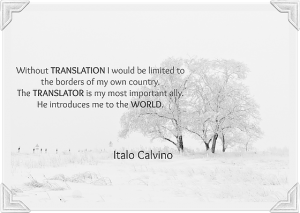Greater than 3 minutes, my friend!
What No One Tells You About Translation The impact of translation in our daily life.
Translation isn’t a very popular subject outside the industry. Most people don’t understand how translators work and the majority of them think that they won’t need translators because: “Well, we can use Google.”. Thinking about that, I decided to start a series of articles to talk about the importance of translation, its process, how machine translation is not going to replace humans anytime soon, how do translators work, and many other things.
Let’s start with the basics: What is a translation? Why is it important? How does translation impact our daily lives?
What is a translation?
Translation is the process of converting text from one language to another. Translators communicate the source text’s meaning and getting the message across in a target language. It might sound rather easy, but it is not. As it is impossible to translate a text word by word, because language’s structures differ massively from one to another, a translator needs to understand the whole message that the author wants to convey and convert this message to the target audience. For example, to translate a text from English to Portuguese, a translator has to build a text with a whole new structure to convey the exact meaning of the English message.
Translation is an ancient activity. One of the first evidence of this process was found in the Rosetta Stone, where it was found three versions of a decree issued in Egypt, 196 BC. On the stone’s top part the text was written in a hieroglyphic and Demotic script, at the bottom part, the text was written in ancient Greek. As the text was essentially same, with minor differences, the Rosetta Stone was the key element to deciphering Egyptian hieroglyphs. The Rosetta Stone was the first Ancient Egyptian bilingual text recovered in modern times, and it aroused widespread public interest with its potential to decipher this previously untranslated hieroglyphic language.
Interesting Fact: St. Jerome is considered the father of translation. He spoke Greek, Latin, and Hebrew and spent three decades creating the Latin version of the Greek Bible, which would become the standard for more than a millennium. Hence, on the Christian feast day of St Jerome, September 30th, we celebrate the International Translation Day since 1953.
Why is translation important? How does it impact our lives?
Translation is saving lives. Translators Without Border’s Words of Relief Crisis Response Network is a global translation and localisation initiative that is leveraging both human and technological resources. The project builds capacity to facilitate and improve communication among victims, field workers, and relief agencies during and after crises.
Translation is creating jobs. The translation market it will be worth $37 billion by 2018 (Source: IBIS World). There are numerous small companies offering translation and interpreting services around the globe and they are not only employing translators and interpreters but hiring a sales force, people who work in marketing, project managers, accountants, lawyers and so on.
Translation keeps the economy growing. When doing business globally, the key element is mutual understanding, which is made possible generally by professional translators and interpreters. Companies that are able to communicate effectively in more than one language are most likely to sell their products and services all around the world, consequently boosting the economy.
Translation is essential to history. If it wasn’t for translations, our knowledge of ancient civilisations would be limited. A while ago, scholars at the Rice University published a translation of a 1,800-year-old letter from a Roman soldier to his family. You can check it out here: smithsonianmag.com
Translation entertains us. Translation enables us to read the masterpieces of Shakespeare, Dante, Cervantes, Dostoevsky, Victor Hugo and many others. Plus, let us not forget about movies, plays, video games and series that are subtitled or dubbed daily. The world can enjoy Game of Thrones, for example, in their native language. Imagine how sad it would be if only English speakers would have such pleasure?
Even if you speak English, which is considered the language of the world, translation is still a huge part of your life. Remember the last time you were in the supermarket? Yes, a lot of the food we buy comes from other countries, therefore, its labels need translation. What about that German car? And that electronic manufactured in China?
These are only a few examples of how important translation actually is and the huge impact it has in our everyday life. So, next time you pick up that Ikea manual, take a moment to think about the Swedish to English (Italian or German) translator that made it possible for you to, at least try, assemble that nice piece of furniture.







Hey Flavia, it is about time someone gave us translators some space 🙂 I think this kind of acknowledgment goes hand in hand with the improvement of some of our sector’s issues. It’s funny that you mentioned Game of Thrones: I felt somewhat satisfied when the latest season of GoT was released in my country last Summer and a major translation issue arising from a sudden revelation was the main topic of conversation for days! I may not have felt fulfilled as a viewer, but I definitely no longer felt invisible as a translator 🙂
Hi, Eleonora! I am happy you enjoyed! And yes, I completely understand what you said about GOT. Because in Brazil it was also a huge deal when they could not translate “hordor= hold the door” properly in Portuguese. So, only then people, especially my friends and family, realised how hard and important the job of a translator actually is. I think it we need to start educating people so they will get to know what we do exactly and then value our profession.
People have contact with translated content every day, but they don’t realize how many people were involved in getting that manual/label/movie ready in their own language for them to consume.
Keep the texts coming, Flavia.